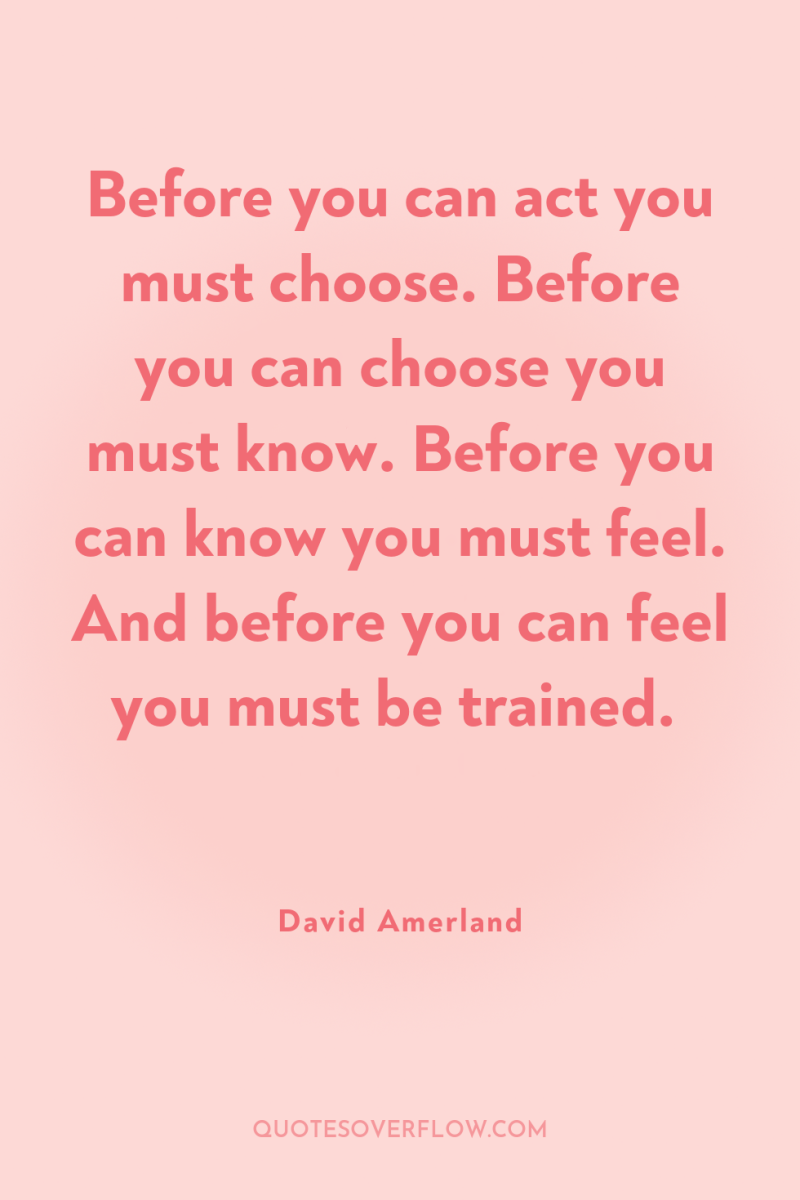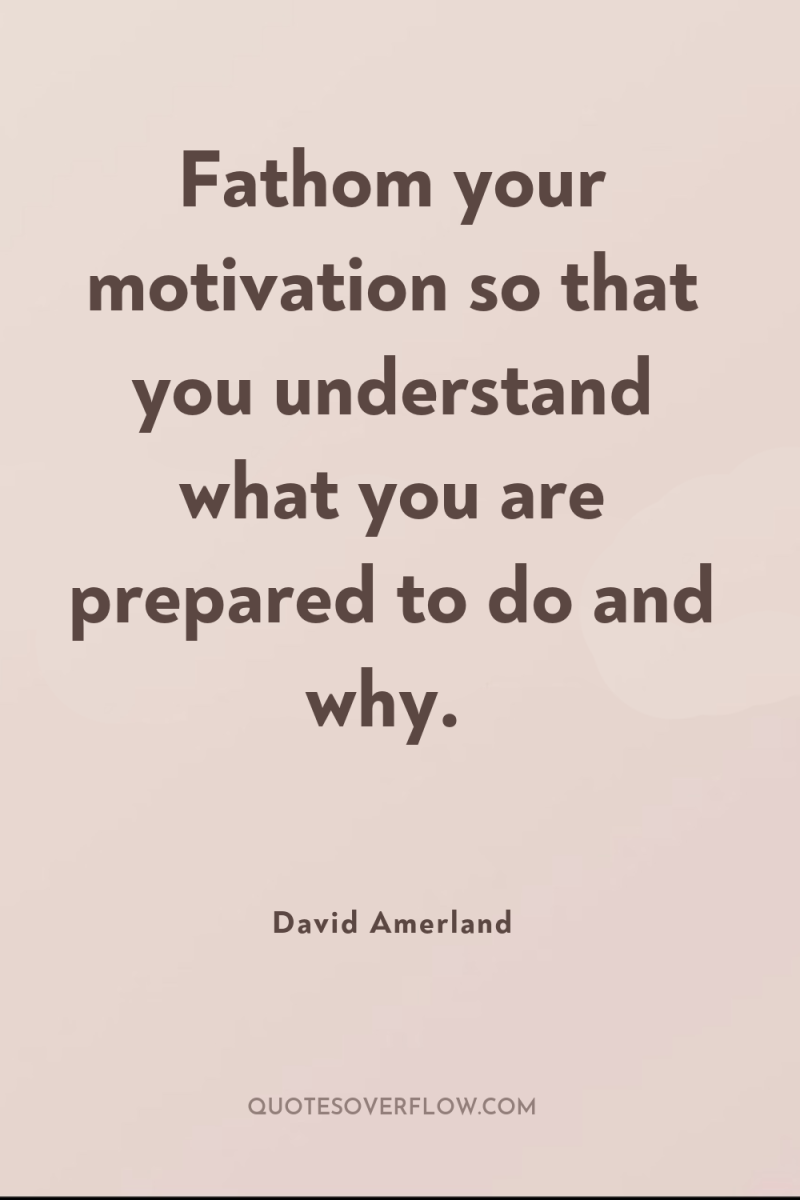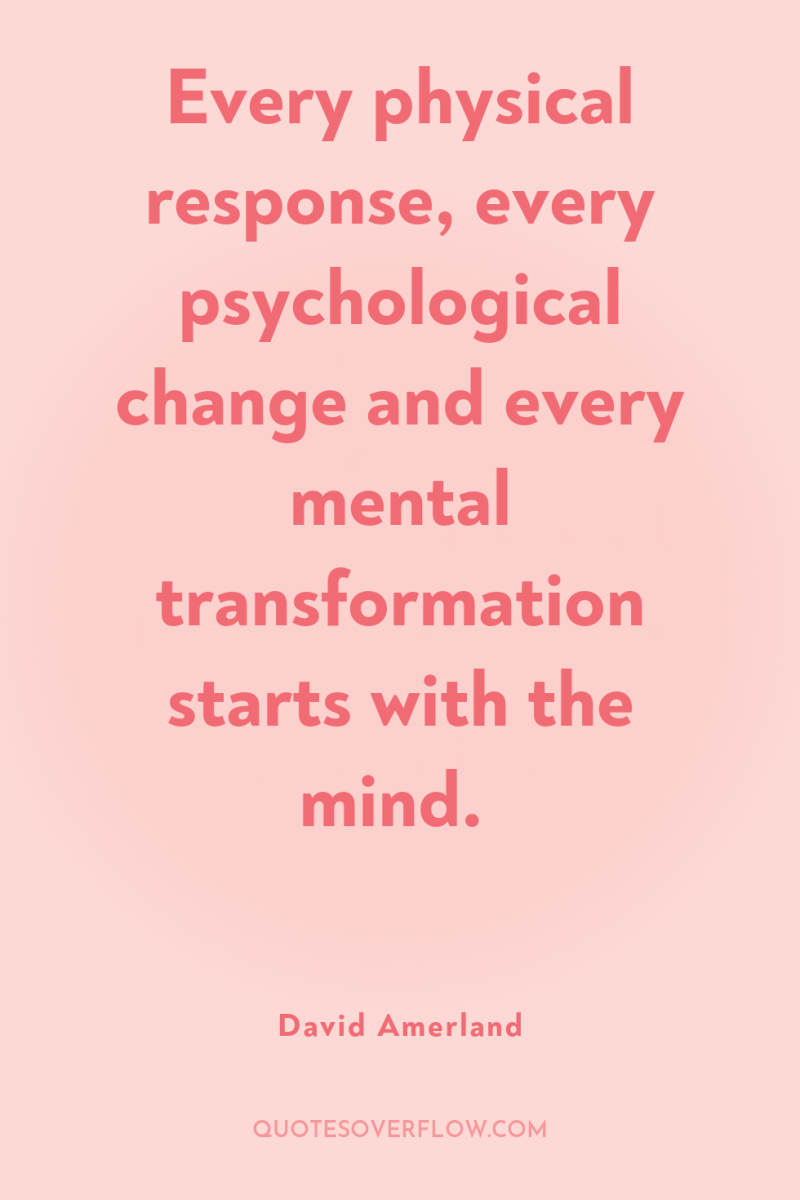
1
Before you can act you must choose. Before you can choose you must know. Before you can know you must feel. And before you can feel you must be trained.David Amerland

2
Fathom your motivation so that you understand what you are prepared to do and why.David Amerland

3
Every physical response, every psychological change and every mental transformation starts with the mind.David Amerland
4
Leaders lead by example. No leader asks more than he is prepared to give himself.David Amerland
5
The moment you establish a line of communication between two points, you subtly change both. That is also true for the way the brain is affected by the mind.David Amerland
6
We cannot learn something new and stick to it without a modular approach to application, positive reinforcement and a real change of environment.David Amerland
7
Reality is not a thought experiment.David Amerland
8
Trust cannot, in the real world, be just a matter of personal choice.David Amerland
9
Mindless action without a real understanding of the ramifications is only likely to result in serious miscalculations or a colossal waste of time. Avoid both by using your judgment, filtered through both knowledge and experience. Use common sense and logic as a counterbalance to emotion.David Amerland
10
These mental and physical components of self belief are closely interlinked. They are used to slowly interweave the perÂsonal narratives that very effectively create a powerful sense of identity.David Amerland
11
Familiarity with the brand requires some experience of it (via advertising, word of mouth, internet publicity), Confidence comes with the perception of competence in the brand itself (which is why new brands really need to work hard for people to experience them first) and Trustworthiness refers to the sense of whether the brand is going to live up to its promise of reliability for the price paid.David Amerland
12
Every relationship is governed by motive, capability and reliability and these three factors become the core components of the trust equationDavid Amerland
13
Trust is an ethereal quality. Like oxygen or light we notice it only by its absence.David Amerland
14
We trust strangers not because they are always trustworthy but because we want to believe in a world where they are.David Amerland
15
Despite the fact that logic tells us that we should not trust anyone, in any situation where the unknown variables are too many or the risks too high, we nevertheless go ahead and take what can only be called a leap of faith.David Amerland
16
Life at the edge of the world, it was felt, could go on forever.David Amerland
17
Risks must balance rewards.David Amerland
18
In the digital domain trust is now important not only because we really need to know how to trust people and whom to trust but because we need others to trust us and have to learn how to help them do so.David Amerland
19
The presence of Knowledge Based Trust in organizations gives rise to a high level of interpersonal trust amongst their members and creates cohesive units out of a loose bunch of people.David Amerland
20
When something is as fundamental as trust the danger is that everyone thinks they understand what it is and therefore fail to define it.David Amerland
21
Initial or mutual trust (the type of trust that makes us, irrationally, trust strangers) then enabled the complex planning that allowed man to transition from a tribe of hunter-gatherers whose fate depended on external factors to an agricultural society where complex, planned outcomes could be put into motion.David Amerland
22
Trust is what monetizes the attention economy.David Amerland
23
Marketing effectively, in a semantic web, revolves around those three ‘little’ requirements: Trust, Authority, Reputation.David Amerland
24
We are hard-wired to engage with those we trust, and this hard-wiring has led to a constant push for greater interaction and connection on the Web.David Amerland
25
Without the mind the body is not capable of delivering anything beyond an average performance.David Amerland
26
It seems perverse that we can be more social than anyone would have thought possible when we are at our most anti-social, locked away from the world and silently staring at a computer screen, but that, as psychologists will tell you is the way we operate. When we are at the maximum of our disconnect we also are ready to connect and feel the need for interaction.David Amerland
27
When it comes to identity we are all constructs. Who we think we are is the result of our upbringing, memories, skill set, knowledge, experiences and personal belief system. Of all the onion layers that make us who we are, our belief system is what powers our core. It’s what creates the essence of a human being and makes it possible for each of us to exceed our limits, confound expectations and do the impossible. .David Amerland
28
Confidence, even when under pressure, has a way of turning an impossible situation into just another challenge to be met.David Amerland
29
Our insecurities drive us. Our fears control us. We try to hide the first and deny the second and it is exhausting us.David Amerland
30
Semantic search requires three things: Trust, Authority and Reputation. All three revolve around your digital profiles, their activity and the sentiment levels and engagement that each generates. Semantic search also requires differentiation — the ability of search to understand the “uniqueness” of you.David Amerland
31
A business needs a character and an identity, just like a person and just like a person it needs to have a Voice.David Amerland
32
The greatest challenge on the Web in the twenty-first century is to connect with your target audience in a way that enriches both them and you.David Amerland
33
Communication without a specific focus is just noise. It achieves little beyond taking time and energy.David Amerland
34
To succeed in the digital realm, technology has to provide a strong disruptive element right from the start. If things cannot be done differently , a transition to digital is not going to be compelling enough for a wide enough adoption to create sustainability.David Amerland
35
The brain works in a holistic, cooperative way that makes our basest desire or most abject fear as expressive of who we are as abstract thinking of the highest order. That means that we are all equal part snakes, monkeys, and spacemen.David Amerland
36
Everything that happens now in the online world is part of a conversation.David Amerland
37
Social media is addictive precisely because it gives us something which the real world lacks: it gives us immediacy, direction, a sense of clarity and value as an individual.David Amerland
38
Social media is the empowerment of the individual at the expense of the system.David Amerland
39
The web and its technologies are digital representations of everything we did before in a more private, bigger, faster and more empowering format than ever before.David Amerland
40
To win at semantic search you need more people than are on your payroll.David Amerland
41
When it comes to measuring the effectiveness of your engagement in the social media environment what counts are: Comments and Sentiment.David Amerland
42
When it comes to semantic search and the success of your social media policy, truly, there is only one thing that absolutely counts: engagement.David Amerland
43
Real-time marketing is not for everyone. To take advantage of it, you need to have a clear idea of what it is you want to achieve through it.David Amerland
44
Companies that cannot successfully answer what they do fail to then understand how they can continue to do it in the face of change.David Amerland
45
It is not wrong to think that the traditional buying of a product has been replaced with an unwritten contract of shared values between a business and its customers.David Amerland
46
Evolution has geared the human stress response to last about thirty seconds. It's enough time to facilitate fight or flight. Evolution has not adapted our brains or bodies to handle weeks or months of prolonged stress.David Amerland
47
There is a fine line deep within the mind that makes self-belief and confidence, the defining elements of success and failure in any circumstance. How we learn to activate them without running the risk of lying to ourselves is the key that unlocks the superhuman lying dormant within us.David Amerland
48
It is no accident that in the field of philosophy ontology is the study of reality, existence and coming into being. In the fields of information retrieval (semantic search) and computing, ontology is the naming of the types, interrelationships and properties of the entities that exist (in reality or conceptually) and which define a particular domain of knowledge or expertise.David Amerland
49
Everything that happens now in the online world is part of a conversation. The problem with this (if we can call it a problem) is that this conversation takes place frequently asynchronously and often across platforms.David Amerland